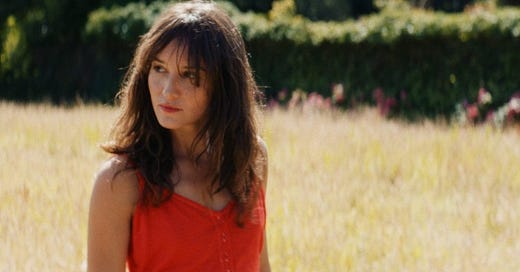Anaïs in Love
A familiar subject, the romantic misadventures of an impulsive girl-child, fails to undertake any meaningful introspection in this French trifle.
It’s actually not unusual to dislike a main character in a movie. Some of the most dastardly cinematic villains stood out because they were so charming or just delightfully weird, from Hans Gruber to Hannibal Lecter to Annie Wilkes.
But it’s quite another thing for a protagonist to be unlikeable — as in, someone who has few redeeming qualities, and what they have is overshadowed by an incessantly irritating or distressing nature.
I’ve seen it done, rarely: Brenda Blethyn in Mike Leigh’s “Secrets and Lies” stands out. More often, though, it turns out like the title character from “Anaïs in Love,” the new French romance starring Anaïs Demoustier.
Anaïs is a perennial woman-child, a person in a grown-up body who does very adult things and yet is a completely self-centered id-monster. Written and directed by Charline Bourgeois-Tacquet, the film is at first glance a familiar “failing at love” story about a young woman who has all sorts of terrible affairs in her quest to find Mr. (or Ms.) Right.
This being the French, of course it’s just M. Right Now.
As played by Demoustier, Anaïs is a girl on the run — quite literally. She’s constantly late wherever she goes, riding her bike because she’s broke and is claustrophobic about using the Parisian subway. Anaïs has excuses for all of the people she’s letting down: her landlord, her parents, her (constantly changing) employer, her erstwhile boyfriend, Raoul (Christophe Montenez).
Never does the ever-in-motion Anaïs stop long enough for some introspection or, heaven forfend, face her own shortcomings. She prefers to leg about coltishly in her summer dresses, hop in and out of someone’s bed if it pleases her, and before you know it she’s already moved on to the next thing that captivates her.
Maybe you’ve known someone like this in your own life, as a friend, an observer or a lover. So you know they’re immediately charming upon first meeting, but in time you’ll recognize them for the utterly empty, atrocious person they are.
In fact, there was another movie about a very similar woman that came out last year called “The Worst Person in the World.” And it was one of the best movies I saw in 2021, due in large part to the fact that the romantic misadventures eventually lead to some serious reckoning.
It never happens here… well, I should say it almost happens. But then the movie slips back on its fleeting charm, as if afraid to confront the moment.
Anaïs’ nature is to be always falling in love, but never touch true devotion.
Early in the movie she meets Daniel (Denis Podalydès), an older publisher with whom she soon begins an affair. It’s one of those beddings that only happen in movies: lithe, raven-haired, twentysomething Anaïs and a 60ish, anxious, bald dweeb.
Only Woody Allen had it so (incongruously) good when it comes to screen lovelies.
She soon tires of this fling — because of course — though Daniel is no prize, either. He wants to continue the affair with Anaïs despite having a longtime girlfriend, Emilie (Valeria Bruni Tedeschi), stating simply that he wants to have both stability and passion in his life. Selfish, but at least honest.
Anaïs is curious about Emilie because she’s a writer, which is what she sorta-kinda aspires to be, whenever she momentarily falls back on her academic studies. She happens to bump into her and goes all fangirl on Emilie, and becomes convinced that they’re meant to be best friends… or even something more.
Anaïs crashes a summer writers’ symposium that Emilie is attending, works her usual flirty imposition thing by getting free room and board in exchange for doing some handywork around the place — and you can guess how dedicated she is to that. Instead she uses her time to stalk Emilie, befriend her and insist upon some kind of relationship.
Emilie, for her part, sees right through Anaïs’ fog of lies and flattery. And yet she’s intrigued by this wild young mare throwing herself at her. To complicate things more, Daniel shows up unexpectedly at the retreat, and becomes convinced Anaïs is undertaking the whole crush as some kind of toxic revenge.
Who’s to say if he’s right or wrong? Anaïs is so ungoverned by anything resembling logic, or even basic human empathy, that my guess is half the time she’s not sure herself why she does the things she does. In a more interesting movie, she’d find out or at least undertake that exploration.
“Anaïs in Love” is a movie about a woman who uses her beauty and innate sensuousness to get the things she wants, until she doesn’t want them anymore. Question is, why would anyone want a person like that — or watch a movie about them?





